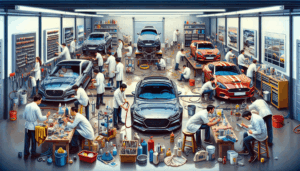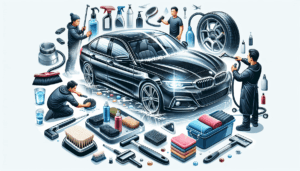Have you ever wondered why automotive detailing can be quite pricey? At Ace Mobile Detailing, we understand that the cost of our services may seem high at first glance. However, there are several factors that contribute to the price tag. We are dedicated to providing top-notch service and using the best products on the market to ensure that your vehicle or boat looks its absolute best. Our licensed and insured professionals are committed to making our clients feel amazing and satisfied with the results. So, what exactly goes into the cost of detailing? Let’s take a closer look.
Labor Intensive Process
Hand washing and drying
Detailing involves meticulous hand washing and drying of the vehicle’s exterior. This process ensures that every corner and crevice is thoroughly cleaned, removing dirt, grime, and stains. Hand washing is time-consuming but necessary to achieve a spotless finish.
Interior cleaning and vacuuming
Detailing also includes a thorough interior cleaning and vacuuming of the vehicle. This involves removing debris, dust, and dirt from carpets, upholstery, and surfaces. Detailers pay close attention to every nook and cranny, leaving the interior fresh, clean, and odor-free.
Clay bar treatment
To remove stubborn contaminants such as tar, bugs, and tree sap, detailers use a clay bar treatment. This process requires expertise and delicate techniques to ensure that the vehicle’s paint remains intact. The clay bar treatment leaves the paint surface smooth and prepared for the next step.
Paint correction
Detailing includes paint correction to remove scratches, swirl marks, and other imperfections. This process requires specialized tools and products, as well as expert skills. Detailers carefully restore the vehicle’s paintwork to its original glossy finish, increasing its aesthetic appeal.
Waxing and sealing
To provide long-lasting protection to the vehicle’s paint, detailers apply wax or sealant. This step not only enhances the vehicle’s shine but also acts as a barrier against environmental elements such as UV rays, dirt, and pollutants. Waxing and sealing require precision and attention to detail.
Specialized Equipment and Products
High-quality cleaning agents
Detailers utilize high-quality cleaning agents that are specifically designed to tackle tough dirt and stains without damaging the vehicle’s surfaces. These products are often more expensive compared to regular household cleaners but are necessary for achieving professional-level results.
Professional-grade polishing and buffing machines
To achieve flawless paint correction, detailers use professional-grade polishing and buffing machines. These machines are designed to effectively remove imperfections from the paint surface while minimizing the risk of damage. They require skill and expertise to operate safely and efficiently.
Steam cleaners
Detailers often utilize steam cleaners to deep clean and sanitize various surfaces inside the vehicle. Steam is an effective and eco-friendly method that eliminates bacteria, germs, and odors without the need for harsh chemicals. Steam cleaners help maintain a clean and hygienic interior for the occupants.
Specialized brushes and tools
Detailers employ specialized brushes and tools to access hard-to-reach areas and ensure a thorough cleaning. These brushes are designed with soft bristles to prevent scratches and are specifically tailored for cleaning delicate surfaces like leather upholstery and dashboard components.

Time and Expertise Required
Thorough inspection and assessment
Before beginning the detailing process, detailers conduct a thorough inspection and assessment of the vehicle’s condition. This step allows them to identify any areas that require special attention or possible repairs. The inspection ensures that the detailing process is tailored to the specific needs of each vehicle.
Attention to detail
Detailing requires meticulous attention to detail to ensure that every surface, no matter how small or hidden, is cleaned and restored to perfection. Detailers invest significant time and effort into achieving a flawless finish, paying attention to each individual surface and component.
Extensive training and experience
To become a skilled detailer, extensive training and hands-on experience are essential. Detailers undergo comprehensive training to learn the proper techniques, usage of equipment and products, and the intricacies of different surfaces. Experience allows detailers to refine their skills and develop an eye for detail.
Knowledge of different surfaces and materials
Detailers possess in-depth knowledge of various surfaces and materials found in vehicles. This knowledge enables them to use the appropriate products and techniques that will effectively clean and restore each surface without causing damage. Understanding the characteristics of different materials is crucial to deliver outstanding results.
Variety of Services Offered
Different packages and options available
Detailing shops offer a variety of packages and options to cater to different customer needs and budgets. Whether a customer wants a basic exterior wash or a full interior and exterior detail, there are options available to suit their preferences. These packages are designed to offer flexibility and customization.
Additional services such as scratch removal, odor removal, and paint protection film
Apart from standard detailing services, shops often provide additional services such as scratch removal, odor removal, and the application of paint protection film. These services address specific customer concerns and enhance the overall appearance and longevity of the vehicle.

Cost of Supplies and Materials
Expensive cleaning and detailing products
Professional-grade cleaning and detailing products used by detailers are often more expensive than regular consumer products. These specialized products are formulated to deliver superior results and protect the vehicle’s surfaces. The cost of sourcing and using these high-quality products adds to the overall cost of detailing.
Polishes, sealants, and waxes
Detailing often involves the application of polishes, sealants, and waxes that are specially formulated to enhance the vehicle’s appearance and provide long-lasting protection. These products are typically more expensive than over-the-counter options due to their superior performance and durability.
High-quality microfiber towels, applicators, and brushes
Detailers rely on high-quality microfiber towels, applicators, and brushes to ensure a safe and effective cleaning process. These tools are designed to minimize the risk of scratches and damage to the vehicle’s surfaces. While more expensive than regular towels and brushes, they are crucial for achieving professional results.
Insurance and Licensing
Liability insurance to protect against damages
Detailing shops carry liability insurance to protect themselves and their customers against any accidental damages that may occur during the detailing process. This insurance provides peace of mind to customers, knowing that they are financially protected in case of any unforeseen incidents.
Licensing fees and requirements
Operating a professional detailing business often requires specific licenses and permits, which come with associated fees. These licenses ensure that the shop complies with industry standards and regulations, guaranteeing that customers receive top-quality service.
Compliance with industry standards and regulations
Detailing shops must adhere to industry standards and regulations to maintain their reputation and professionalism. Compliance ensures that the shop operates ethically, follows safety guidelines, and employs environmentally sustainable practices. Meeting these standards incurs additional costs but contributes to the overall quality of the service.

Operating Expenses
Rent or mortgage payments for shop space
Detailing shops incur rent or mortgage payments for their physical location. Having a dedicated space allows them to provide a controlled and secure environment for detailing services. These expenses contribute to the overall cost of detailing.
Utility bills and maintenance costs
Detailing shops have utility bills and maintenance costs associated with running their facility. Expenses such as electricity, water, heating, and cooling contribute to the operational costs. Additionally, regular maintenance of equipment and facility upkeep ensures a smooth workflow and optimal service quality.
Advertising and marketing expenses
To attract customers and establish a strong presence in the market, detailing shops invest in advertising and marketing campaigns. These initiatives, such as online and print advertising, social media presence, and promotional events, require financial resources. The cost of marketing is a necessary expense to reach target customers and build a reputable brand.
Employee wages and benefits
Detailing shops employ skilled detailers who require fair compensation for their expertise and hard work. Employee wages, along with benefits such as insurance coverage and retirement plans, add to the operating expenses. Ensuring fair compensation supports a motivated and dedicated team, ultimately benefiting the customers.
Mobility and Convenience
Overhead costs for mobile detailing units
Some detailing shops provide mobile services, bringing the detailing process to the customer’s location. Operating mobile units incurs additional overhead costs such as vehicle maintenance, fuel expenses, and mobile equipment. These costs allow customers to enjoy the convenience of having their vehicles detailed at their preferred location.
Travel expenses to customer locations
Detailing shops that offer mobile services face additional travel expenses. These expenses include fuel costs, vehicle maintenance, and time spent traveling to customer locations. Despite these added costs, mobile detailing provides convenience and flexibility for customers who prefer not to travel to a physical shop.
Convenience of on-site service
Mobile detailing services offer the convenience of having the vehicle detailed without the need to travel to a shop. Customers can have their vehicles detailed at their home, office, or any other preferred location. The on-site service saves time and effort for customers, making it an attractive option.

Customer Satisfaction Guarantee
Investment in customer satisfaction
Detailing shops prioritize customer satisfaction and invest in measures to ensure a positive experience. From the initial consultation to the completion of the detailing process, detailers strive to meet and exceed customer expectations. This investment includes ongoing training, improving service quality, and incorporating customer feedback.
Potential for rework and touch-up services
In the rare event of any issues or customer dissatisfaction, detailing shops often offer rework or touch-up services to rectify the situation. Detailers are committed to resolving any concerns and ensuring that customers are fully satisfied with the results. This commitment to customer satisfaction may involve additional time and effort.
Customer retention and referral benefits
By providing exceptional service and customer satisfaction, detailing shops aim to build long-term relationships with their clients. Satisfied customers are more likely to become repeat customers and refer the shop to their friends, family, and colleagues. These referrals contribute to the overall success and growth of the business.
Market Demand and Pricing
Supply and demand dynamics
The demand for professional detailing services plays a significant role in pricing. As the demand increases, detailing shops may adjust their pricing to balance supply and demand. Additionally, factors such as the availability of skilled detailers in the market and the competition among detailing shops influence pricing decisions.
Competitive pricing in the local market
Detailing shops consider the pricing strategies of their competitors in the local market. Prices may vary depending on the level of service, quality of products used, and the reputation of the shop. Detailers aim to offer competitive pricing while maintaining the highest standards of quality and customer satisfaction.
Pricing based on the quality and reputation of the shop
Established detailing shops with a strong reputation and a track record of delivering outstanding results may charge higher prices. Customers are willing to pay more for the assurance of superior quality and professionalism. The pricing reflects the value placed on the expertise and experience provided by the detailing shop.





